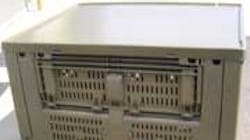Klinge offers collapsible food storage bins
Klinge Corporation has released its new collapsible storage bins for transport and storage of perishable items. The food storage bins (FSBs), made of polypropylene, have passed a variety of MIL-STD tests.
With a footprint of 4 x 3.3 feet (1.2 x 1 meters) and an internal volume of 203 gallons (770 liters), six of the FSBs fit inside a 10-ft insulated container and 18 fit inside a 20-ft insulated container. The FSB collapses to a height of 12 inches (309 mm), allowing nearly three of the collapsed FSBs on a return trip to be transported in the space of one.
Sturdiness was not compromised by the collapsible design. The FSBs are so strong that six can be stacked fully loaded, yet each only weighs 110 lbs (50 kgs).
York PA-based Klinge will provide 1,500 of the FSBs to the Australian Defense Force. They will be used to transport food from Klinge refrigerated containers to field kitchens. As required by Klinge’s multi-year contract, the FSBs passed several MIL-STD tests at a facility in Melbourne, Australia:
•Salt and corrosion—A sample of the polypropylene was placed inside a salt test chamber followed by storage in a climatic test chamber set to 40° C/104° F with 93% relative humidity. At the conclusion of the test, no visual changes were apparent.
•Water pressure test—External and internal surfaces of the FSB were sprayed with a high-pressure water cleaner at approximately 150 bar and 156 gallons (590 liters) per hour. After the test, no sign of deformation was found.
•Transit drop test—A FSB loaded with about 1,653 lbs (750 kg) of bottled water was dropped from a height of 12 inches (30 cm) and allowed to fall freely. After five drops, no damage was apparent and FSB was able to collapse and re-erect without issue.
•CL2 high-temp—The FSB was subjected to three cycles of the Category A2 conditions. At the conclusion of the test, no visual or functional damage was noted.
•M14 vibration test—The FSBs were loaded into Klinge’s refrigerated containers (operating temperature set to –18° C/0° F) and transported over cross-country terrain and rough course without incident.
•Thermal shock—The FSB was first stabilized at a set temperature of –25° C/–13° F in an environmental test chamber and then placed in a secondary chamber set to 70° C/158° F. Five minutes later, the FSB was moved back to the original test chamber set at –25° C/–13° F. After the alternating cycles were repeated five times, visual and functional checks were conducted and showed no damage.
•Stacking and leakage test—The FSB was tested to ensure that they were easily stackable on top of one another, would withstand stacking for a long period of time, would not leak into any FSB underneath, and would drain when upright.
Call 717-840-4500 or e-mail [email protected] for more information.
